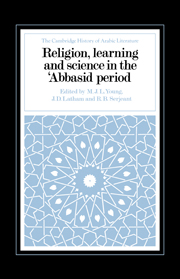Book contents
- Frontmatter
- Epigraph
- Contents
- List of plates
- Editorial preface
- List of abbreviations
- Map Literary, political and religious centres in the ʿAbbasid period
- 1 Sunnī theology
- 2 Shīʿī theological literature
- 3 Ibāḍī theological literature
- 4 Quranic exegesis
- 5 The prose literature of Ṣufism
- 6 Philosophical literature
- 7 Arabic lexicography
- 8 Arabic grammar
- 9 Islamic legal literature
- 10 Administrative literature
- 11 Arabic biographical writing
- 12 History and historians
- 13 Faṭimid history and historians
- 14 Mathematics and applied science
- 15 Astronomy
- 16 Astrology
- 17 Geographical and navigational literature
- 18 The literature of Arabic alchemy
- 19 Arabic medical literature
- 20 Al-Kindī
- 21 Al-Rāzī
- 22 Al-Fārābī
- 23 Ibn Sīnā
- 24 Al-Bīrūnī and the sciences of his time
- 25 Al-Ghazālī
- 26 Christian Arabic literature in the ʿAbbasid period
- 27 Judaeo-Arabic literature
- 28 The translation of Greek materials into Arabic
- 29 Didactic verse
- Glossary
- Bibliography
- Index
23 - Ibn Sīnā
Published online by Cambridge University Press: 05 July 2014
- Frontmatter
- Epigraph
- Contents
- List of plates
- Editorial preface
- List of abbreviations
- Map Literary, political and religious centres in the ʿAbbasid period
- 1 Sunnī theology
- 2 Shīʿī theological literature
- 3 Ibāḍī theological literature
- 4 Quranic exegesis
- 5 The prose literature of Ṣufism
- 6 Philosophical literature
- 7 Arabic lexicography
- 8 Arabic grammar
- 9 Islamic legal literature
- 10 Administrative literature
- 11 Arabic biographical writing
- 12 History and historians
- 13 Faṭimid history and historians
- 14 Mathematics and applied science
- 15 Astronomy
- 16 Astrology
- 17 Geographical and navigational literature
- 18 The literature of Arabic alchemy
- 19 Arabic medical literature
- 20 Al-Kindī
- 21 Al-Rāzī
- 22 Al-Fārābī
- 23 Ibn Sīnā
- 24 Al-Bīrūnī and the sciences of his time
- 25 Al-Ghazālī
- 26 Christian Arabic literature in the ʿAbbasid period
- 27 Judaeo-Arabic literature
- 28 The translation of Greek materials into Arabic
- 29 Didactic verse
- Glossary
- Bibliography
- Index
Summary
Ibn Sīnā is outstanding among Arabic authors for the unusually warm reception which he has been given in Europe. The secret of his success is to be found in the way that his writings synthesize all the most original features of Muslim philosophy.
It is often claimed in histories of philosophy that Arabic philosophy's only merit is its transmission of Greek, mainly neo-Platonic, thought. This oversimplifies the subject in a misleading way, for, by dispensing with the need to analyse Arabic philosophy in its own right, it relieves the student of all the technical obstacles to an understanding of the subject. A strange language, a different religion, an altogether foreign cultural milieu: these and numerous other considerations are dismissed at once.
Ibn Sīnā's acceptance in the West is indicative of the affinity which exists between his outlook and European systems of thought, an affinity that is less strongly felt in the cases of other Arabic philosophers, although, like Ibn Sīnā, nearly all of them lived in times of crisis. The crises experienced in Ibn Sīnā's lifetime were not only of a political nature but arose mainly from antinomies between Muslim religious principles, and those of the cultures which were being assimilated by an expanding Islamic empire. The resulting conflicts were what in Western terms would be called antagonisms between faith and reason. Ibn Sīnā's solution to this aporia captured the minds of the medieval Christian world, not only as a solution in its own right, but also on account of the influence which it exercised on later Arabic philosophers: on Ibn Rushd, for example, who was to play such an important part in the renaissance of medieval Christian thought.
- Type
- Chapter
- Information
- Religion, Learning and Science in the 'Abbasid Period , pp. 389 - 404Publisher: Cambridge University PressPrint publication year: 1990
- 1
- Cited by



